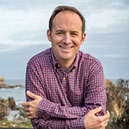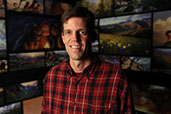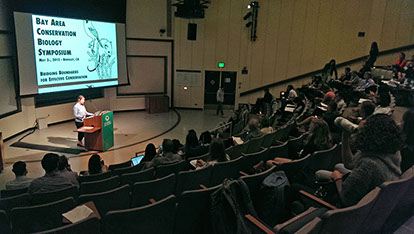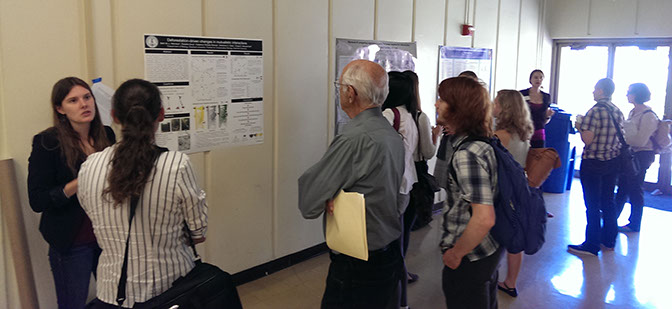


2019 Bay Area Conservation Biology Symposium
The Bay Area Conservation Biology Symposium (BACBS) is a one-day conference that showcases the pioneering conservation biology science by students and professionals around the Bay Area.
Founded in 1999 by the Berkeley Chapter of the Society for Conservation Biology, it has become a Bay Area tradition, hosted each spring on a rotating basis between different local universities including Stanford, University of California-Davis, University of California-Santa Cruz and San Francisco State University. The symposium provides a unique forum in which to build connections and collaborations between myriad academic, governmental, and NGO institutions around the Bay.
2019 BACBS was hosted at Berkeley on Saturday, April 27.
Event program with full details is here.
Special thanks to our keynote speakers:
Dr. Kyle Van Houtan - Director of Science at the Monterey Bay Aquarium, and
Dr. Flora Lu - Professor of Environmental Studies at UC Santa Cruz.
Our 2019 event also included a "Science through Story" Workshop, co-led by Sara ElShafie, Integrative Biology PhD Candidate at UC Berkeley, and Matt Nolte, Character Art Director at Pixar Animation Studios!
"Science through Story" Workshop:
Science is a search for evidence, but science communication is a search for meaning. Nothing makes content more meaningful than a good story. Drawing inspiration from creative processes in the film industry, this workshop offers tools to help scientists share their content with the public through compelling stories. Using examples from both popular films and scientific studies, we will explore how to humanize a subject through story development and draw in broad audiences through visual storytelling.
About the speakers:
Dr. Kyle Van Houtan is the director of science at the Monterey Bay Aquarium where he oversees the Aquarium's research, including programs devoted to bluefin tuna, white sharks, sea otters and other species. He concurrently holds an adjunct professorship at the Nicholas School of the Environment at Duke University. His research explores global change, biodiversity conservation, processes arising from climate, long-term ecological monitoring, and ethics. In 2012, Dr. Van Houtan received the Presidential Early Career Award for Scientists and Engineers from President Obama for his pioneering research on the climatic regulation of juvenile recruitment in sea turtle populations.
Dr. Van Houtan earned his Bachelor of Arts degree from the University of Virginia, a Master of Science degree from Stanford University, a Ph.D. from Duke University, and completed postdoctoral research at Emory University. Before joining the Aquarium, he served as a program leader for NOAA in Hawaii where he led many initiatives in protected species, climate and historical ecology. His work has been featured on National Public Radio and in National Geographic, Nature, The New York Times, Science, Scientific American, Smithsonian, Wired and more. He lives in northern California with his wife and two children.
Dr. Flora Lu is the Pepper-Giberson Endowed Chair and Professor of Environmental Studies at University of California, Santa Cruz and Provost of Colleges Nine and Ten. She earned her A.B. in Human Biology from Stanford University and her Ph.D. in Ecology from the University of North Carolina at Chapel Hill. She has conducted longitudinal research in the Ecuadorian Amazon on the topic of Indigenous subsistence, resource use and livelihoods, and has also established a food justice program at UCSC in partnership with community organizations in Watsonville.
A National Science Foundation Graduate Fellow, Royster Society Fellow, and Lang Post-Doctoral Fellow, Dr. Lu began conducting research in the Amazon while as an undergraduate in 1992. As an ecological anthropologist, she is interested in human/environment dynamics in tropical rainforests, the political economy of oil extraction, resource governance, and household economics. Her longitudinal fieldwork among indigenous communities in the northeastern Ecuador has been featured in two programs on the National Geographic Channel, has been funded by $2.7 million in external grants, and has been published in four books and three dozen publications in journals such as Human Ecology, Conservation Biology, Current Anthropology, Human Organization, and the Journal of Ecological Anthropology. She is the recipient of the Division of Social Sciences “Golden Apple” Distinguished Teaching Award (2010); Committee on Teaching's Excellence in Teaching Award (2011); and Chancellor’s Diversity Award (2016).
Sara ElShafie is a Doctoral Candidate in Integrative Biology at the University of California, Berkeley. Her research, based at the UC Museum of Paleontology at Berkeley, investigates climate change impacts on animal communities over time. ElShafie is also passionate about making science accessible and exciting for broad audiences. She developed a workshop series on story training for scientists and science educators in collaboration with artists at major film studios. She has been running these workshops at university campuses, museums, conference venues, and even theme parks across the continent over the last three years. She recently organized a symposium, Science Through Narrative: Engaging Broad Audiences, at a major biology conference with speakers from scientific fields as well as arts and entertainment industries.
Matt Nolte has been at Pixar Animation Studios since 2004. His roles have included Animator, Character Designer, and Character Art Director. He worked on Cars, Ratatouille, Brave, The Good Dinosaur, Incredibles 2, and the Pixar short Lava. He is currently working on Pixar's next original film Onward. Matt grew up drawing animals, never knowing that his love for drawing and animation would lead to a job. He still loves watching ants in his backyard and imagining what it would be like to shrink to that size.
This event was co-sponsored by UC-Berkeley's Dept. of Environmental Science, Policy, & Management (ESPM); and funded in part by grants from the UC-Berkeley Graduate Assembly.
_______________________________________________________________
The Berkeley Chapter has hosted the conference six times: in 1999, 2003, 2007, 2011, 2015, and 2019. You can access archival copies of past symposium websites to the right.
If you are a group of students or staff interested in hosting a future conference, contact us! We have many resources that can help with planning and executing the conference successfully.























